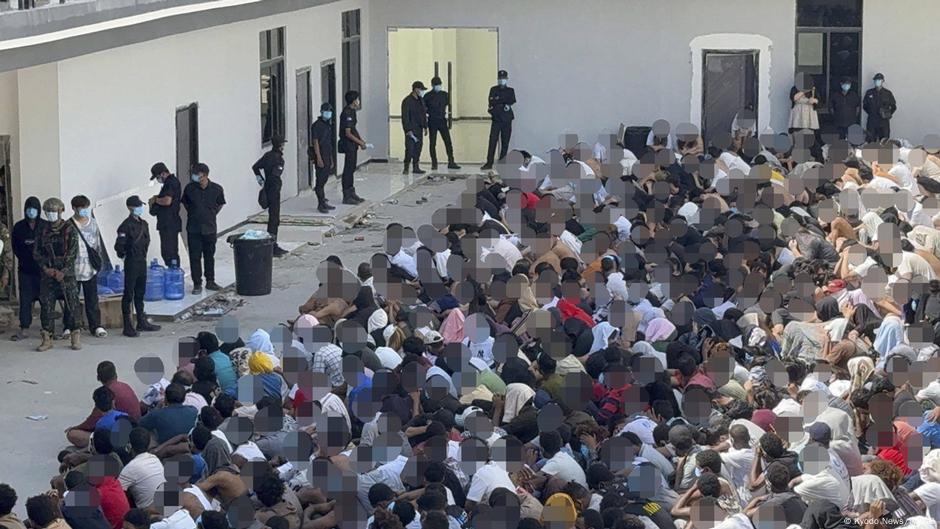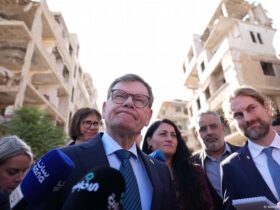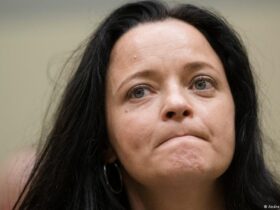Heads of state are gathering in the Brazilian city of Belém on Thursday and Friday for a summit of global leaders ahead of the UN COP30 climate conference.
This year’s summit is taking place in the heart of the Amazon – a sensitive region for climate stability – as pressure grows to curb rising emissions and global warming, which is causing deadly extreme weather around the world.
Germany and Britain are among fewer than 60 countries likely to send heads of state. European Commission President Ursula von der Leyen also wants to attend.
Leadership is more important than ever
Although the leaders’ meeting is not generally expected to yield concrete climate solutions, Johan Rockström, director of the Potsdam Institute for Climate Impact Research in Germany, said it is important in setting the direction of COP talks.
“There would not have been a Paris Agreement without the first Heads of State Summit.”
He says the presence of leaders such as then-German Chancellor Angela Merkel and US President Barack Obama was crucial to facilitating the landmark 2015 treaty, under which signatories agreed to try to limit warming to 1.5 degrees Celsius (2.7 degrees Fahrenheit) above pre-industrial levels.
Rockström says negotiators will be looking to the leaders’ summit to provide a “north star” for setting goals in upcoming negotiations.
Geopolitical tensions, multiple wars, economic uncertainty due to US tariffs as well as President Donald Trump’s withdrawal from the Paris Agreement and rollback of clean energy policies have created a challenging environment for this year’s talks.
Mark Weissgerber, executive director of E3G, an independent climate think tank in Germany, said the leaders’ summit is more important than ever because of geopolitical weakness and market insecurities. “The country, the industry, the investors and the citizens are not sure where the road is going.”
Opportunity to change emission path
“The tone that needs to be set is to really do right,” said Leanne Vandamme, senior campaigner on human rights and climate change at the Center for International Environmental Law.
Leaders, especially those of wealthy countries, need to signal a huge increase in ambition and accountability to reduce emissions in line with the Paris Agreement, he said.
A week before the start of COP30, only a third of countries had submitted their national targets for reducing emissions. The targets presented include a 10% reduction in emissions by 2035, which scientists say is only one-sixth of what is needed.
Leaders at the summit need to send a political message that recognizes we are “on a path to disaster,” Rockstrom said.
According to the United Nations, current climate policies could lead the world to more than 3 °C (5.4 °F) of warming by the end of the century, which Rockström says would have “unbearable consequences for humanity on Earth.”
Reaffirm the 1.5C Paris Agreement target
Last week UN Secretary-General Antonio Guterres said the world would “inevitably” exceed the Paris Agreement’s 1.5C target and have “disastrous” consequences for the world.
Scientists consider this limit a vital line of defense against the most serious and irreversible damage of climate change.
Rockström says it is important that leaders at the summit reaffirm their commitment to the temperature target.
“My fear – which we cannot let happen – is if suggestions start to emerge that we should abandon the 1.5°C limit,” Rockström said.
He said that just as exceeding the speed limit on the road does not mean restrictions should be abolished, leaders need to use the summit to admit failure, pledging that they will do everything they can to reduce speeds above the target agreed in the Paris climate accord. “This will greatly help in negotiations.”
Concrete commitments on climate finance
Weisgerber stressed the need for more concrete commitments on financing adaptation, which is currently “grossly inadequate”.
He wants leaders to send a clear signal about how they plan to exceed the $300 billion target by 2035 agreed at last year’s climate summit in Baku. The goal is to help developing countries deal with climate disasters and transition to clean energy.
He is also hoping to see greater ambition on the so-called ‘Baku to Belem Roadmap’, which aims to mobilize $1.3 trillion of public and private funds annually by 2035 to support adaptation plans and low-carbon development for developing countries.
Carsten Elsner, an energy researcher at the Wuppertal Institute, a German environmental research organization, said Brazil’s flagship initiative the Tropical Forests Forever Facility (TFFF) will likely take prominence in the talks.
The TFFF is a proposed $125 billion global conservation fund that would pay countries based on how well they protect their forests.
He said the fund could be attractive to some donor countries because it promises a return on investment, unlike other forms of climate finance such as grants.
Elsner said, “I think countries will just jump to it… This is something that could really bring some countries together into an alliance.”
strengthening global cooperation
Experts say one of the challenges at the leaders’ summit will be overcoming deep political divisions and faltering international cooperation.
Vandamme said the talks would be an opportunity for leaders to signal that despite the backdrop of the crisis in multilateralism, there is still confidence in the global system. He said global climate governance must prove that it can provide the solutions needed to tackle the climate crisis.
Ahead of the summit, a German Environment Ministry spokesperson said that with the principle of international cooperation under pressure, the event would be an opportunity to show that the vast majority of the global community wants to continue working together to tackle climate change.
With the U.S. pulling out of the Paris Agreement, the leaders’ summit will also see “new alliances” emerge, Weisgerber said. He expects major emitters such as Brazil, the EU, Britain and China to play a greater leadership role.
Vandamme said she would also like to see whether leaders at the summit respond to the International Court of Justice’s landmark advisory opinion on the legal obligations of states in relation to climate change. With the decision expected from July this year, badly affected states can seek compensation from big polluters.
Edited by: Tamsin Walker






Leave a Reply